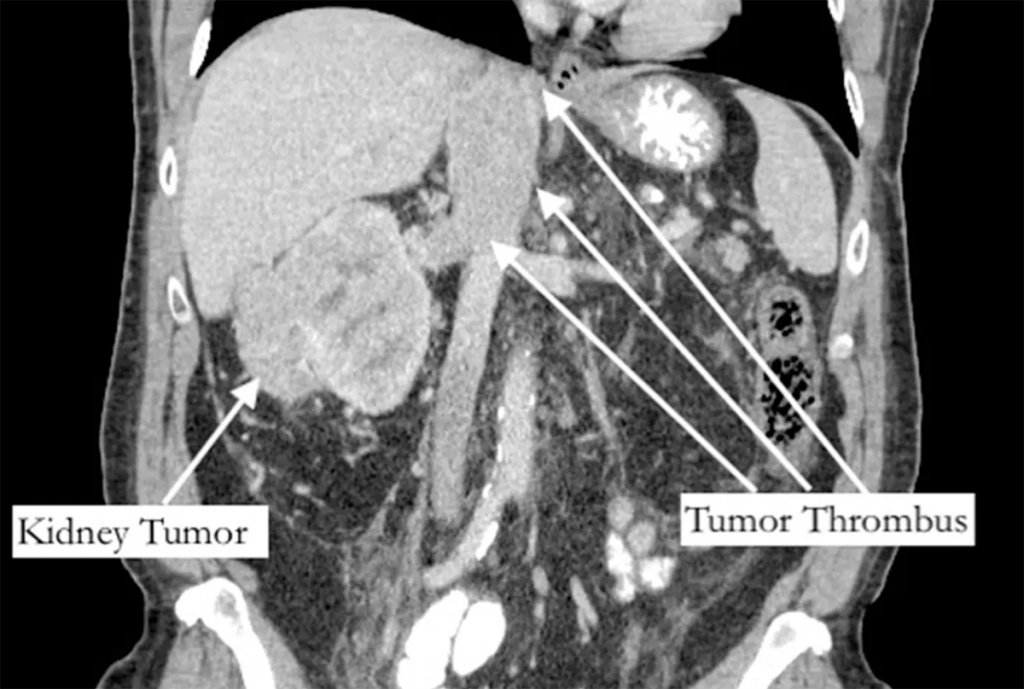Understanding Kidney Cancer
- A father of one from Montvale, New Jersey, was shocked to find out that his toe and ankle pain was actually a symptom of kidney cancer.
- Kidney cancer develops when cells in the kidneys, a pair of bean-shaped organs each about the size of a fist, begin to grow out of control. Renal cell carcinoma is the most common type of kidney cancer.
- Kidney cancer can metastasize, or spread, to any part of the body through the blood or lymphatic system. When that happens, the first signs of cancer may not be specific to your kidneys.
Richard Bernstein, 62, told The New York Post that he began experiencing pain in his right toe about five years ago, but his doctor didn't think much of it.
Read MoreThe swelling caused him to visit his general practitioner, who took an abdominal scan during his appointment. (There was also a small lung on Richard's chest that his doctor discovered that prompted the scan.) The scan alarmed his GP, so the doctor referred Richard to a specialist in urology, who gave Richard the bad news: he had kidney cancer.
The scans showed that Richard had a large cancerous kidney tumor and tumor thrombus (this is when a tumor is extending into a vessel, typically a vein) that had moved through the renal vein and filled the vena cava, which is the main vein draining into the heart.

"He told me I had four days to live," Richard said.
"If my whole leg didn't swell up, I would have dropped dead," Richard added.
However, Richard is obviously (and thankfully) still alive, as he's here now to tell the tale of his diagnosis. It's all thanks to his surgeon who performed a "complex" procedure in order to remove the tumor.
Richard's doctors believe they removed all of his kidney cancer during the roughly 12-hour procedure, so he thankfully won't need to undergo any additional treatment. Now, he said, his focus is on his continued recovery.
The operation was a success, and afterwards, Richard was sedated in the hospital for about three days before he was discharged to a rehabilitation facility to rebuild his strength. Thanks to physical therapy, Richard is now walking without assistance and working on gaining back all the weight he lost (about 30 pounds!)
"I'm still suffering from a fog a bit," Richard said. "There was no serious pain at all. My advice is if something is wrong and they can't find it, don't give up looking. Trust your feelings about your own body."
Advocating for Yourself
Like Richard says, it’s important to stand up for yourself if you feel that you're being dismissed or mistreated by a doctor. Getting a second opinion is crucial if something doesn't feel right. Luckily, Richard received the help he needed.
Be Pushy, Be Your Own Advocate… Don't Settle
Dr. Zuri Murrell, a colorectal surgeon at Cedars-Sinai Medical Center, previously told SurvivorNet that sometimes, patients need to be pushy.
"From a doctor's perspective, every problem should have a diagnosis, a treatment, a plan for follow-up, and a plan for what happens next if the treatment doesn't work," Dr. Murrell said.
And as a patient, "if you don't feel like each of these four things has been accomplished, just ask! Even if it requires multiple visits or seeing additional providers for a second opinion, always be your own advocate."
Understanding Kidney Cancer
Kidney cancer develops when cells in the kidneys, a pair of bean-shaped organs each about the size of a fist, begin to grow out of control. Renal cell carcinoma is the most common type of kidney cancer. In fact, about 9 out of 10 kidney cancers are RCCs. (It’s unclear what type of kidney cancer Richard was diagnosed with.)
It’s estimated that about 79,000 new cases of kidney cancer (50,290 in men and 28,710 in women) will be diagnosed in the United States for 2022, so here are some signs of the disease to look out for:
- Blood in the urine (hematuria)
- Low back pain on one side (not caused by injury)
- A mass (lump) on the side or lower back
- Fatigue (tiredness)
- Loss of appetite
- Weight loss not caused by dieting
- Fever that is not caused by an infection and doesn't go away
- Anemia (low red blood cell counts)
According to UCLA Health, kidney cancer can metastasize, or spread, to any part of the body through the blood or lymphatic system. When that happens, the first signs of cancer may not be specific to your kidneys.
Symptoms of metastatic kidney cancer may cause symptoms in the newly affected areas of the body including:
- The lungs, causing cough and shortness of breath
- The bones, resulting in bone pain or fracture
- The brain, presenting as headaches, confusion or seizures
That being said, all of these signs don’t necessarily mean you have cancer. Still, you should always bring up any changes to your health with your doctors.
Learn more about SurvivorNet's rigorous medical review process.

